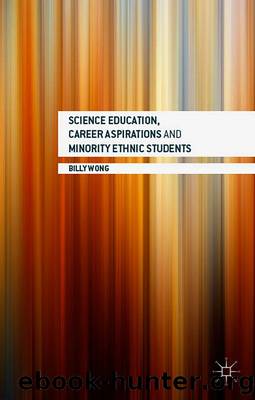Science Education, Career Aspirations and Minority Ethnic Students by Billy Wong

Author:Billy Wong
Language: eng
Format: epub
Publisher: Palgrave macmillan
6
Science Capital
As social beings, we continuously learn and absorb what we experience about the world around us like sponges, especially the young. The ‘sponge’ (or what Bourdieu might call habitus) embodies our disposition and knowledge repertoire. Although the sponge appears personal and specific to us, our lives and experiences are often not as individualized as we might expect. Bourdieu (1977, 1984) argued that wider structural structures (for example, social class) essentially govern the type of disposition and capital we eventually acquire and internalize. For Bourdieu, social class is central to the re/production of social privileges because individuals are socialized with values and resources that are specific to people from their own social class background, which enables their position in society to be maintained across generations. We can apply this principle to the context of science and minority ethnic young people. For example, what kind of capital do students have in relation to science? Is access to science capital structured by ethnicity, gender and social class? To what extent do these science resources support the science career aspirations of minority ethnic youths? Existing studies in Australia (Lyons, 2006) and Hong Kong (Ho, 2010) have found science capital to be important for post-compulsory science study.
As discussed in Chapter 2, Bourdieu’s concept of capital forms a part of his wider theory on social class reproduction, which includes the notions of habitus and field. In brief, the habitus (which is patterned by social class position) constitutes an individual’s set of norms and dispositions, which are developed within particular social boundaries (fields). Each field has its own structure and means of operation. Capital represents the valued resources and knowledge within each field, even though some capital can operate across fields.
This chapter explores the field of science, with the focus on the emerging concept of science capital in the context of young people’s science education and science career aspirations. We begin with a review of the current thinking and ongoing developments around science capital. Focusing on minority ethnic students, we then qualitatively explore their economic, social and cultural capital in relation to educational, career and science aspirations. Here, we demonstrate that the relationship between social class and capital is complicated by ethnicity. We also shed light on the potential distinction between direct and indirect forms of social capital in relation to science career aspirations, as well as instances of neglected capital among some minority ethnic students. We conclude with a reflection on the nature of science capital.
What do we mean by science capital?
The concept of capital is multifaceted and has been theorized extensively (particularly social capital) by the likes of James Coleman (1988, 1990), Nan Lin (2002), Robert Putnam (2001) and Francis Fukuyama (2001), just to name a few. In essence, capital refers to resources but these can be in many forms, such as human capital (for example, manpower), linguistic capital (for example, language skills), emotional capital (for example, emotional intelligence and wellbeing), economic capital (for example, money), social capital (for example, contacts and networks), symbolic
Download
This site does not store any files on its server. We only index and link to content provided by other sites. Please contact the content providers to delete copyright contents if any and email us, we'll remove relevant links or contents immediately.
The Art of Coaching Workbook by Elena Aguilar(48059)
Trainspotting by Irvine Welsh(20052)
Twilight of the Idols With the Antichrist and Ecce Homo by Friedrich Nietzsche(17705)
Fangirl by Rainbow Rowell(7832)
Periodization Training for Sports by Tudor Bompa(7327)
Change Your Questions, Change Your Life by Marilee Adams(6639)
This Is How You Lose Her by Junot Diaz(5768)
Grit by Angela Duckworth(4735)
Red Sparrow by Jason Matthews(4663)
Asking the Right Questions: A Guide to Critical Thinking by M. Neil Browne & Stuart M. Keeley(4573)
Paper Towns by Green John(4169)
Room 212 by Kate Stewart(4102)
Ken Follett - World without end by Ken Follett(3972)
The Sports Rules Book by Human Kinetics(3586)
Housekeeping by Marilynne Robinson(3401)
The Motorcycle Diaries by Ernesto Che Guevara(3332)
Introduction to Kinesiology by Shirl J. Hoffman(3299)
Exercise Technique Manual for Resistance Training by National Strength & Conditioning Association(3291)
Double Down (Diary of a Wimpy Kid Book 11) by Jeff Kinney(3272)
